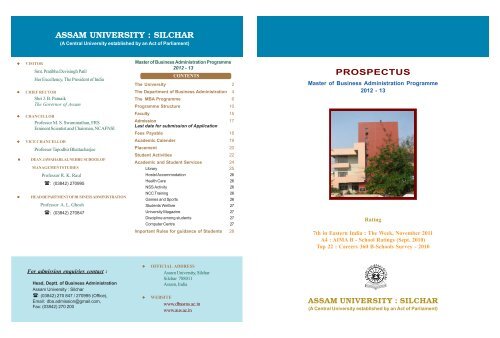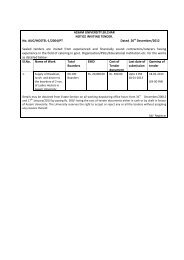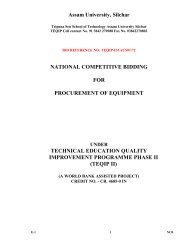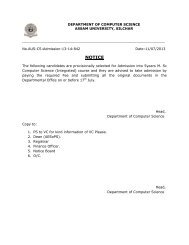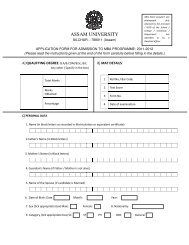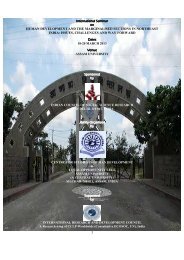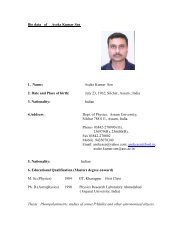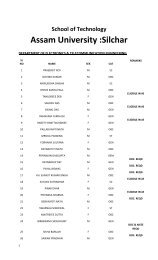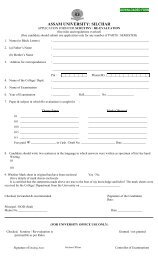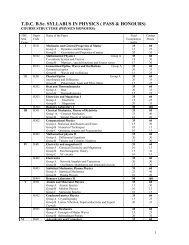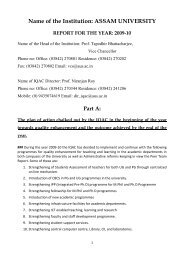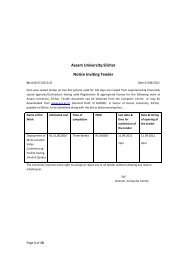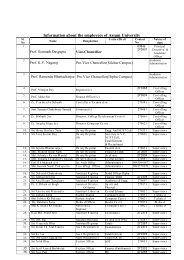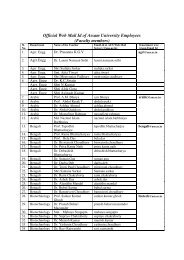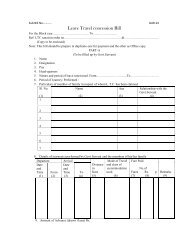MBA Admission Prospectus 2012 - Assam University
MBA Admission Prospectus 2012 - Assam University
MBA Admission Prospectus 2012 - Assam University
Create successful ePaper yourself
Turn your PDF publications into a flip-book with our unique Google optimized e-Paper software.
ASSAM UNIVERSITY : SILCHAR<br />
(A Central <strong>University</strong> established by an Act of Parliament)<br />
• VISITOR<br />
Smt. Pratibha Devisingh Patil<br />
Her Excellency, The President of India<br />
• CHIEF RECTOR<br />
Shri J. B. Patnaik<br />
The Governor of <strong>Assam</strong><br />
• CHANCELLOR<br />
Professor M. S. Swaminathan, FRS<br />
Eminent Scientist and Chairman, NCAFNSI<br />
• VICE CHANCELLOR<br />
Professor Tapodhir Bhattacharjee<br />
• DEAN JAWAHARLAL NEHRU SCHOOL OF<br />
MANAGEMENTSTUDIES<br />
Professor R. K. Raul<br />
: (03842) 270995<br />
• HEAD DEPARTMENT OF BUSINESS ADMINISTRATION<br />
Professor A. L. Ghosh<br />
: (03842) 270847<br />
Master of Business Administration Programme<br />
<strong>2012</strong> - 13<br />
CONTENTS<br />
The <strong>University</strong> 2<br />
The Department of Business Administration 4<br />
The <strong>MBA</strong> Programme 6<br />
Programme Structure 10<br />
Faculty 15<br />
<strong>Admission</strong> 17<br />
Last date for submission of Application<br />
Fees Payable 18<br />
Academic Calender 19<br />
Placement 20<br />
Student Activities 22<br />
Academic and Student Services 24<br />
Library 25<br />
Hostel Accommodation 26<br />
Health Care 26<br />
NSS Activity 26<br />
NCC Training 26<br />
Games and Sports 26<br />
Students Welfare 27<br />
<strong>University</strong> Magazine 27<br />
Discipline among students 27<br />
Computer Centre 27<br />
Important Rules for guidance of Students 28<br />
PROSPECTUS<br />
Master of Business Administration Programme<br />
<strong>2012</strong> - 13<br />
Rating<br />
7th in Eastern India : The Week, November 2011<br />
A4 : AIMA B - School Ratings (Sept. 2010)<br />
Top 22 : Careers 360 B-Schools Survey - 2010<br />
For admission enquiries contact :<br />
Head, Deptt. of Business Administration<br />
<strong>Assam</strong> <strong>University</strong> : Silchar<br />
: (03842) 270 847 / 270995 (Office),<br />
Email: dba.admission@gmail.com,<br />
Fax: (03842) 270 200<br />
• OFFICIAL ADDRESS<br />
<strong>Assam</strong> <strong>University</strong>, Silchar<br />
Silchar 788011<br />
<strong>Assam</strong>, India<br />
• WEBSITE<br />
www.dbasms.ac.in<br />
www.aus.ac.in<br />
ASSAM UNIVERSITY : SILCHAR<br />
(A Central <strong>University</strong> established by an Act of Parliament)
From Vice-Chancellor<br />
<strong>Assam</strong> <strong>University</strong><br />
(A Central <strong>University</strong>)<br />
Silchar 788 011<br />
<strong>Assam</strong> (India)<br />
We teach our Students -<br />
• to be Earnest in endeavour;<br />
• to develop the skill and Expertise;<br />
• to be Elegant in their etiquette &<br />
dealings; and<br />
• to strive continually for Excellence.<br />
We also teach Students -<br />
• to uphold values and Ethics.<br />
Our Mission is -<br />
• to prepare Managers of the World Class<br />
who would Position themselve by their Indian Prerspective and<br />
global vision<br />
Department of Business Administration<br />
<strong>Assam</strong> <strong>University</strong> : Silchar<br />
In our tryst with destiny through continuous pursuit for excellence, <strong>Assam</strong> <strong>University</strong> is now recognized by the Academic<br />
Community all around to have attained the visible phase of maturity. In our history of last 18 years, we have traversed<br />
quite a long way engraved with hillocks and meadows. But the visible academic ambience in the <strong>University</strong> clearly signposts<br />
the unchallengeable fact that our relentless journey towards academic consolidation has gained momentum. We<br />
indeed take pride in reaffirming our motto, 'Excelsior' i.e., towards excellence. The preceding years have been eventful as<br />
we have successfully followed our policy of participatory management. As a result of this, the <strong>University</strong> premises have<br />
attained a countenance of a self-contained township. All most all 32 Post Graduate and Integrated Departments have been<br />
accommodated in their respective permanent buildings and all the buildings have been named after some illustrious sons<br />
and daughters of Mother India or eminent personalities of great human family of academic excellence. Last year India<br />
Today survey ranked <strong>Assam</strong> <strong>University</strong> 41st position among 539 Universities. We have successfully implemented choice<br />
based credit system (CBCS) in PG and integrated courses and also semester system in the UG programmes in affiliated<br />
colleges.<br />
We believe in the maxim that our essence is what we have been since this belief inspires us to go further and further. Hence,<br />
we remind ourselves that we could accredit ourselves by NAAC with B Grade with CGPA of 2.85 in the 4 point scale<br />
which is equivalent to B++ as per previous system.<br />
We developed a well orchestrated Office of the Director, Internal Quality Assurance Cell which added sharp dynamism in<br />
all academic activities. On the basis of our newly acquired strength, we have upgraded it as the Directorate of the Internal<br />
Quality Assurance which now has a Director, a Deputy Director and two Assistant Directors from amongst the faculty<br />
members to ensure rapid and systematic growth of academic attainment in the <strong>University</strong>. Very recently we have<br />
successfully completed the Academic and Administrative Audit which was conducted by 5 external experts.<br />
The Construction works for a few hostels for the boys and girls, academic buildings for various Departments in the School<br />
of Technology and a few other projects are all most at stages of completion. Here we sincerely recognize the generous help<br />
and co-operation of the Ministry of Human Resource Development and the <strong>University</strong> Grants Commission from time to<br />
time. That is why we could implement the reservation system of the Govt. of India for different marginalized Sections of<br />
the society in letter and spirit as per the scheme of capacity expansion. Constructed of several other quarters for the<br />
teaching and non-teaching staff as well as the International Guest House are also almost complete. This massive expansion<br />
project could be successful only because of the cumulative efforts of our able Officers, non-teaching employees and<br />
Engineers. I take this opportunity to record my appreciation for all of them because only due to their contribution, the<br />
processes of regeneration and empowerment have been able to alleviate us to the level of multi-dimensional maturity in no<br />
time.<br />
I am delighted to inform here that we equipped our all the Departments with Smart Class room facility and internet<br />
connectivity through which our teaching and learning process is gearing up to higher altitude. Some other modern facilities<br />
are also under way. <strong>University</strong> can be proud of its fully digitized campus of e-Governance. The ambitious e-governance<br />
'Project Shreyamsi' of <strong>University</strong> has been formally inaugurated by the Hon'ble Education Minister of <strong>Assam</strong>, Dr.<br />
Himantabiswa Sharma on 16th April <strong>2012</strong>. This E-Governance will usher in a new era of maturity in our <strong>University</strong><br />
system through the process of sharpening our efficiency and speed, commitment and dedication. In the coming 12th Plan<br />
proposal we have submitted our proposal to open more academic departments along with many centres of study for new<br />
phase of creative learning in the <strong>University</strong>.<br />
We signed Memoranda of Understanding with various Universities of Bangladesh, Canada, China and few other countries<br />
and through the National and International Academic Collaboration Cell which we have created, we have been able to<br />
formulate academic collaboration with the Universities of Mauritius and United Kingdom, Japan, Canada and Slovakia<br />
because, the sky is our limit. We are leaving no stone unturned to reap the harvest from the benefits made available by the<br />
National Knowledge Commission.<br />
I sincerely hope that with the aforesaid phenomenal extension and augmentation of academic activities which include<br />
outreach programmes and rapidly increasing facilities for our students, researchers and teachers, <strong>Assam</strong> <strong>University</strong> would<br />
be able to nourish and produce the worthy citizens of our country as well as the flag bearers for the greater human world<br />
of knowledge. I reiterate once again that, Yes, we have promises to keep and miles to go before we look back.
THE UNIVERSITY<br />
A<br />
ssam <strong>University</strong>, Silchar was established in 1994 as a Central<br />
<strong>University</strong> by an Act of Parliament (Act 13 of 1989) enforced through<br />
Notification of the Government of India.<br />
The <strong>University</strong> over the years has made impressive strides in establishing<br />
itself as a premier institution of learning in North East India where<br />
emphasis persistently has been on the blending of quality education,<br />
socially relevant endeavours and scientific pursuits with missionorientation<br />
and tireless striving for excellence.<br />
The sprawling <strong>University</strong> Campus is spread over an area of about 600<br />
acres where 34 Post Graduate Departments under sixteen Schools of<br />
Studies of the <strong>University</strong> function. The institution provides state-ofthe-art<br />
facilities to students who come from different parts of the country<br />
and abroad. The current roll strength is around 2000 which includes<br />
students at the Post Graduate and Integrated Courses and the students<br />
and researchers at M.Phil. and Ph.D. levels.<br />
The Campus is 23 km off Silchar city. Silchar being gateway to the<br />
southern part of North East India is the hub of commercial activities<br />
and known for its history as the Tea Capital of South <strong>Assam</strong>.<br />
Away from the humdrum of the busy city-life of Silchar and set amidst<br />
its sylvan surroundings, the <strong>University</strong> community engages itself in<br />
academic pursuits.<br />
With the mystique Bhuban and Barail ranges of hills at the backdrop,<br />
<strong>Assam</strong> <strong>University</strong> Campus is surrounded by lush green hillocks, natural<br />
lakes and picturesque tea gardens of South <strong>Assam</strong>. The serene setting<br />
together with exquisite natural beauty in and around the Campus adds<br />
uniqueness to the <strong>University</strong>ís ambience capturing viewersí imagination<br />
and providing an ideal atmosphere for study and research.<br />
2 2 3
T<br />
he Department of Business Administration (DBA) under the<br />
Jawaharlal Nehru School of Management Studies , <strong>Assam</strong> <strong>University</strong><br />
started functioning in July 1997. The Department today is the leading<br />
institution of Management education in North East India.<br />
The mission of the Department is to contribute --- through pursuit of<br />
excellence in teaching and other creative and innovative endeavours<br />
pertaining to management education, research, consultancy and<br />
training --- to the process of developing capable human and managerial<br />
resources and thereby to the corporate, industrial, entrepreneurial,<br />
economic, social, intellectual and cultural development of the nation.<br />
To accomplish its mission, DBA offers AICTE - approved full-time<br />
Master of Business Administration (<strong>MBA</strong>) programme and also<br />
research programme in Management leading to the Degree of Doctor<br />
of Philosophy (Ph.D.).<br />
Alongside its normal academic activities, the Department organises<br />
discussions, seminars, symposia, workshops, study tours, training<br />
programmes and industry - interfaces, among others. The focus is<br />
clearly on developing among the students awareness and in-depth<br />
understanding of the issues that are of contemporary professional<br />
and corporate relevance in India and around the globe.<br />
Academic programmes in DBA are handled by a competent Faculty<br />
whose members have been drawn from different parts of the country<br />
through the process of national-level selection.<br />
The Faculty in DBA has developed over the years core competency<br />
in select areas of Business Administration. These range from<br />
conventional functional areas like Financial Management, Marketing<br />
Management and HRM to such specific areas as Information<br />
Technology Management and Operations Management .<br />
THE DEPARTMENT<br />
The strength of DBA has been built over years around its enabling teaching<br />
learning ambience, dedication of core Faculty, close industry-linkage maintained<br />
through the DBA Corporate Relation Cell and the local chapter of All India<br />
Management Association, global orientation of students (developed and nurtured<br />
through involvement of the Centre for East Asian Business Studies), a vibrant<br />
Learning Resource Centre, and finally the Department’s excellent record of<br />
campus placement.<br />
4<br />
52
THE <strong>MBA</strong> PROGRAMME<br />
T<br />
he Master of Business Administration (<strong>MBA</strong>) is a two year<br />
full-time programme. The programme aims at equipping the students<br />
with a comprehensive set of skills and in-depth understanding of<br />
the theory and practice of real-life-management within the<br />
framework of a multi-disciplinary and multi-cultural setting.<br />
The specific objective of <strong>MBA</strong> programme is to enable the<br />
graduates to ññ<br />
a] understand and be able to analyse the socio-economic,<br />
political, technological and ecological environment of<br />
businesses and their interfaces with the society;<br />
b] acquire state-of-the-art knowledge and skills in the basic<br />
disciplines and functional areas of management;<br />
c] develop positive, dynamic and innovative attitudes so as<br />
to be able to manage change and contribute meaningfully<br />
to organisational growth in a fast-changing borderless<br />
world, and also<br />
d] develop values and sensitivity towards societal problems<br />
and the urge to promote human well-being.<br />
The course-structure for the programme has been designed keeping<br />
in view the immediate on-the-job requirements as well as the longterm<br />
career-needs of the young professionals. Proper balance is<br />
maintained between the general foundation component of the course<br />
and its specialised components.<br />
DBA offers to its students the opportunity to specialise in two<br />
selected areas of their interest under the scheme of dual<br />
specialisation.<br />
The five specialisation / optional areas open to <strong>MBA</strong> Students<br />
areñ<br />
• Marketing<br />
• Finance<br />
• Human Resource Management<br />
• Information Technology Management and<br />
• Operations Management<br />
The important features of the <strong>MBA</strong> programme are the following:<br />
1. Balanced Mix of Theory and Practice:<br />
The <strong>MBA</strong> course structure, which is regularly revised and updated<br />
(the latest updated syllabi came into effect in July 2010) maintains<br />
within it a perfect balance between the theory and the practical<br />
aspects of business management, with the theoretical inputs being<br />
adequately supplemented by such practical components as case<br />
studies, field works, industry visits, interaction with professionals<br />
and project study, among others.<br />
6<br />
72
2. Extensive coverage of the core-courses:<br />
The core-courses offered to the students have extensive coverage<br />
and have been designed in such a way as would facilitate the<br />
exposure of students to the growing and diverse areas of Business<br />
Management.<br />
3. Compulsory Summer Training :<br />
At the end of second semester, all students have to undergo<br />
summer training of a minimum 6 (six) weeks duration with an<br />
industrial, business or service organization. The conditions of<br />
successfully completing the programme remain unfulfilled till a<br />
student undergoes summer training in organizations as approved<br />
by the Department. Each student is required to submit his / her<br />
Summer Training project report to the Department during the third<br />
semester for the purpose of evaluation.<br />
4. Technology focus :<br />
Keeping in view the need for orienting the executives-of-tomorrow<br />
towards the rapidly changing technological environment, the <strong>MBA</strong><br />
programme lays emphasis on aspects relating to management of<br />
technology. While the core-courses include areas like Information<br />
Technology Management, Operations Management, and other<br />
related courses, IT Management is offered also as a distinct<br />
specialisation area. The system of teaching-learning is backed<br />
by audio-visual teaching aids and a Computer Lab designed<br />
specially to cater to the specific needs of the <strong>MBA</strong> Students.<br />
5. Environmental and Ethical Concerns :<br />
One of the important objectives of the <strong>MBA</strong> programme is to<br />
develop within the budding executives a sense of commitment to<br />
values and ethics and a pro-active attitude towards environmental<br />
and societal problems and human well being. The programme<br />
arranges for the purpose relevant academic inputs. Students are<br />
also encouraged to participate in various awareness camps and<br />
voluntary activities through the initiative of the Management Club.<br />
7. Continuous Evaluation :<br />
The scheme of continuous evaluation of students is now in force.<br />
Progress of each student is closely monitored, feedbacks are arranged<br />
to enable the students understand their weaknesses, and counselling<br />
sessions are organised whenever necessary.<br />
8. Internal Assessment :<br />
As per the <strong>MBA</strong> course curriculum, in each theory paper 30 per<br />
cent of the weightage is assigned to internal assessment of students<br />
based on his / her performance in :<br />
• seminars, discussions & group work activities;<br />
• individual and group oral presentations and class tests;<br />
• written assignments, term papers & viva-voce; and<br />
• class-room participation, attendance and discipline<br />
9. Compulsory Project Study:<br />
In the 4th Semester, each student is required to undertake an<br />
independent project work. The purpose of the project study is to<br />
enable the students to study, analyse, interpret and report on one or<br />
more management problems and situations. The study is conducted<br />
following standard methodology of Management Research under<br />
the supervision of a faculty member or an external supervisor<br />
appointed by the Department.<br />
10. Coping with the challenges of Globalisation :<br />
The <strong>MBA</strong> programme attaches due weightage to equipping the<br />
students with state-of-the-art knowledge and skills so that they can<br />
successfully handle the decision -situations that are being faced in<br />
the context of globalisation of business operations. Apart from the<br />
optional and core courses offered in the area, other inputs in the<br />
form of seminars, discussions and face-to-face interaction with<br />
industry executives are also regularly arranged to enhance global<br />
orientation of the students.<br />
6. Emphasis on Communication Skill :<br />
The provision of core papers like Communication for Management<br />
enable <strong>MBA</strong> students improve their communication and<br />
presentation skills. The overall emphasis of the programme<br />
however is on personality development. The programme makes<br />
it imperative for students to regularly attend grooming sessions<br />
and workshops specially designed for their personality<br />
development. The Faculty in DBA is now engaged in preparing a<br />
detailed programme covering even such aspects as Yoga sessions<br />
and Body Language workshops to facilitate the all-round<br />
development of studentsí personality.<br />
8<br />
9
The Master of Business Administration (<strong>MBA</strong>) is a two year<br />
full-time programme.<br />
The programme is organized in two years-First Year and Second<br />
Year, each year comprising two semesters. The list of papers<br />
offered during First Year and Second Year of the programme<br />
shall be as follows:<br />
FIRST YEAR<br />
Semester-I<br />
(Total: 40 Credits)<br />
Code Nameof the Papers Credit Marks<br />
CP-101 Management Process and Principles. 5 100<br />
CP-102 Managerial Economics. 5 100<br />
CP-103 Financial Accounting. 5 100<br />
CP-104 Organization Behaviour. 5 100<br />
CP-105 Environment Management and Business Ethics. 5 100<br />
CP-106 Quantitative Techniques for Management 5 100<br />
CP-107 Marketing Management 5 100<br />
CP-108 Information Technology for Management 5 100<br />
Total 40 800<br />
Semester-II (Total: 40 Credits)<br />
Code Name of the Paper Credit Marks<br />
PROGRAMME STRUCTURE<br />
TURE<br />
CP-201 Management Information System 5 100<br />
CP-202 Management Accounting 5 100<br />
CP-203 CBCS* 5 100<br />
CP-204 Research Methods in Management 5 100<br />
CP-205 Financial Management 5 100<br />
CP-206 Human Resource Management 5 100<br />
CP-207 Operations Management 5 100<br />
CP-208 Business Environment in India 5 100<br />
T0tal 40 800<br />
* 1. Basics of Management - ( for non - <strong>MBA</strong> and non - Commerce) - 5 credits, 50 contact hours<br />
2. Business Communication - (for <strong>MBA</strong>/Commerce - Students)<br />
3. Financial Market Analysis (For <strong>MBA</strong> / Commerce - Students)<br />
SUMMER TRAINING<br />
At the end of second semester, all students will have to undergo summer training of a minimum 6 (six)<br />
weeks duration with an industrial, business or service organization by taking up a project study. The<br />
10<br />
11
conditions for successfully completing the programme shall not be deemed to have been satisfied<br />
unless a student undergoes summer trainning in organizations as approved by the Department.<br />
Each student will be required to submit the project report to the department during the third<br />
semester for the purpose of evaluation in the third semeste.<br />
SECOND YEAR<br />
During Second Year, in addition to compulsory papers and project studies, a student shall have to<br />
choose four optional papers in third semester and five optional papers in fourth semester from the<br />
list of optional papers announced at the beginning of each semester. Under the scheme of Duel<br />
Specialisation, of the nine optional papers a student selects five papers (two in 3rd semester and<br />
three in 4th semester) from any one of the optional groups (to be called Major Group) and four<br />
papers (two in 3rd semester and two in 4th semester) from any of the remaining optional groups<br />
(to be called the Minor Group).<br />
Semester-III (Total 45credits)<br />
Code Name of the Paper Credit Marks<br />
CP-301 International Business Environment 5 100<br />
CP-302 Business Law 5 100<br />
CP-303 CBCS 5 100<br />
CP-304 Summer Training Project. 5 100<br />
CP-305 Entrepreneurship and Small Business Management 5 100<br />
(plus four optional papers) 20 400<br />
Total 45 900<br />
* 1. Management: Functional Areas ( for non - <strong>MBA</strong> ans non - Commerce)<br />
2. Marketing Research (for <strong>MBA</strong>/Commerce - Students)<br />
3. Quantitative Analysis for Financial Decision (for <strong>MBA</strong>/Commerce - Students)<br />
Marketing<br />
MM-3201 Consumer Behaviour.<br />
MM-3202 Advertising Management.<br />
MM-3203 Sales and Distribution Management.<br />
MM-3204 International Marketing.<br />
MM-3205 Marketing of Services.<br />
MM-3206 Marketing of Non-Profit Organizations<br />
MM-3207 Rural Marketing<br />
Human Resource Management<br />
HR-3301 Human Resource Development - Strategies and Systems.<br />
HR-3302 Management of Industrial Relations.<br />
HR-3303 Labour Laws.<br />
HR-3304 Compensation Management.<br />
HR-3305 Management of Trainning and Development<br />
HR-3306 Managing Interpersonal and Group Process.<br />
HR-3307 Cross Cultural and Global Management.<br />
Information Technology Management<br />
IT-3401 System Analysis and Design.<br />
IT-3402 Database Management System.<br />
IT-3403 Decission Support System.<br />
IT-3404 Strategic Management of Information Technology.<br />
IT-3405 Business Data Communication<br />
IT-3406 Enterprise Resource Planning.<br />
Semester-IV (Total: 21 Credits)<br />
Code Name of the Paper Credit Marks<br />
CP-401 Strategic Management 5 100<br />
CP-402 Project Study 5 100<br />
(plus five optional papers) 25 500<br />
Total 35 700<br />
LIST OF OPTIONAL PAPERS<br />
Finance<br />
FM-3101 Management of Financial Institutions.<br />
FM-3102 Security Analysis and Investment Management.<br />
FM-3103 Management of Financial Services.<br />
FM-3104 Project management.<br />
FM-3105 Portfolio Management.<br />
FM-3106 International Financial Management<br />
FM-3107 Risk Management & Financial Derivatives<br />
Operations Management<br />
OM-3501 Material Mangement<br />
OM-3502 Total Quality Management<br />
OM-3503 Production Planning & Control<br />
OM-3504 Operations Research<br />
OM-3505 Supply Chain and Logistic Management<br />
OM-3506 Service Operations Management<br />
PROGRAMME ADMINISTRATION<br />
Evaluation<br />
(i) Each Paper (except CBCS I & CBCS II) will carry 5 credits. The two Papers CBCS I and<br />
CBCS - II will carry 5 credits each. The duration for written examination for each paper shall<br />
be three hours<br />
12<br />
13
CORE MEMBERS<br />
(ii) The credits for internal assessment shall be based on factors<br />
such as<br />
* Participation in seminars, case discussions and group<br />
work activities.<br />
* Class Tests and Individual and group Presentations.<br />
* Submission written assignments, term papers and vivavoce.<br />
* Class room participation and attendance.<br />
The weightage given to each of the components shall be decided<br />
and announced at the beginning of the semester by the Department.<br />
(iii) Scheme of evaluation of project studies should as follows<br />
(a) For paper CP-304, a project report based on the<br />
summer trainning will have to be submitted within<br />
three weeks from the comencement of third semes<br />
ter.<br />
(b) Paper CP-402, Project Study report shall be submit<br />
ted by students towards the end of fourth semester.<br />
After submission of the written report in cases of CP-304 and<br />
CP-402, viva voce will be conducted in each case by duly constituted<br />
examination board. The board of examiners of conducting<br />
the viva voce shall be recomended by the School Board of<br />
the Jawaharlal Nehru School of Management Studies and shall<br />
ordinarily consist of Head of the Department, an internal Examiner<br />
(who should preferably be a professor or senior Associate<br />
Professor / Reader in the Department) and an External Examiner<br />
Professor R. K. Raul Ph. D<br />
Dean<br />
Finance<br />
Professor A. L. Ghosh<br />
M. Com., PGDBIO, ICWA, LL.B., Ph.D.<br />
Professor& Head<br />
Accountancy, Finance,<br />
Costiing, Entrepreneurship<br />
Dr. D. Bhattacharjee<br />
M.Sc.(Stat.), M.Sc.(Comp. Sc.), M. Phil, Ph.D<br />
Associate Professor<br />
QT, IT & Systems Management<br />
Dr. D. Ghose BE, <strong>MBA</strong>, EWT, Ph. D<br />
Assistant Professor<br />
Operations Management, IT &<br />
Systems Management<br />
H. R. Laskar <strong>MBA</strong>, DTM<br />
Assistant Professor<br />
Enterprenuership , Business Law,<br />
International Business Environment<br />
J. Konwar <strong>MBA</strong><br />
Assistant Professor<br />
HRM<br />
D. Choudhury <strong>MBA</strong><br />
Assistant Professor<br />
IT & Systems Management, Marketing<br />
Nilanjana Chakraborty <strong>MBA</strong><br />
Assistant Professor<br />
Marketing, IT & Systems Management<br />
Sonit Dutta <strong>MBA</strong>, BLS<br />
Research Associate<br />
Knowledge Centre Databases<br />
Samit Chowdhury M. Com, M. Phil<br />
Research Associate<br />
Programmes & Operations<br />
Professor A. Mazumdar Ph. D<br />
Professor<br />
Strategic Management, Industry Analysis.<br />
Dr. H. Ramananda Singh<br />
M.Sc. (Maths), <strong>MBA</strong>,PGDCA, Ph.D.<br />
Associate Professor<br />
Marketing, General Management<br />
Dr. A. Burman<br />
M. Com.,(G. U.), PGDipTD, Ph.D(HRM). .<br />
Reader<br />
HRM & Managerial Economics<br />
Dr. Nigamananda Biswas<br />
M. Sc, <strong>MBA</strong>, DCA, Ph.D<br />
Assistant Professor<br />
HRM, Marketing<br />
Dr. R. Singh<br />
M. Com, Company Secretary (Inter), FDPM (IIMA), Ph. D<br />
Assistant Professor<br />
Finance & Accounting<br />
A. K. Das <strong>MBA</strong><br />
Assistant Professor<br />
Financial Services, Services Marketing<br />
L. Rongmei <strong>MBA</strong>, LLB<br />
Assistant Professor<br />
Finance , Accounting, Business Law<br />
R. D. Purkayasthya <strong>MBA</strong><br />
Assistant Professor<br />
Finance , Accounting, Business Law<br />
Chayan Paul M. Sc (Computer Science)<br />
Research Associate<br />
IT & Systems Management<br />
14<br />
15 2
ADMISSION<br />
A Graduate in any discipline from a recognised <strong>University</strong> with<br />
minimum of 50% marks in aggregate in either honours or pass<br />
course or graduate in Engineering, Technology, Pharmacy or<br />
Agriculture with at least 60% marks in aggregate is eligible for the<br />
Master of Business Administration Programme.<br />
<strong>Admission</strong> to the programme is through the MAT conducted<br />
by All India Management Association (AIMA).<br />
The Selection Procedure, besides taking into account academic<br />
achievement of the applicant, also aims at assessing his / her<br />
potential for a management career. Consequently, a multi criteria<br />
selection model is used. The final selection is made on the basis of<br />
MAT score, past academic records, group discussion and personal<br />
interview..<br />
Candidates appearing for Degree (Final Year) Examination<br />
on or before 20 th June <strong>2012</strong> are also eligible to apply for<br />
admission provided they have already cleared degree Part -<br />
I & Part - II Examinations or all earlier semester<br />
Examinations with the minimum qualifying marks as<br />
mentioned in para 1 above ( i.e., 50% in case of general<br />
Degree course - Pass or Honours and 60% in case of<br />
Engineering and other courses). Such students, if selected,<br />
will be required to submit to the department the marksheet<br />
of their final examination positively before the last date<br />
notified by the department for admission.<br />
The approved intake in the <strong>MBA</strong> Programme is 92 (ninety two).<br />
Reservation of seats will be as follows: Scheduled Caste category<br />
(SC) : 15%; Scheduled Tribe category (ST) : 7.5%; Physically<br />
Challenged (PC) : 3%. A relaxation of upto 5% marks in the<br />
qualifying examination is permissible in case of candidates coming<br />
from the reserved categories.<br />
Reservation of seats for other backword categories (OBC) will be<br />
as per Central Government Rules.<br />
• Last Date of submission of Application : 20 th June, <strong>2012</strong>.<br />
• Group Discussion & Personal Interview on : 4 th - 5 th July, <strong>2012</strong>*.<br />
• Display of list of Selected Candidates : 6 th July, <strong>2012</strong>.<br />
• Classes to start on : 16 th July, <strong>2012</strong>.<br />
* No admit card will be issued seperately. Only qualified candidates can attend GD & PI<br />
16<br />
17
FEES PAYABLE BY<br />
<strong>MBA</strong> STUDENTS<br />
ACADEMIC CALENDER <strong>2012</strong>-13<br />
Sl. No. Particulars Amount (Rs.)<br />
01 <strong>Admission</strong> Fee (one time) 1,500.00<br />
02 Tuition Fee (monthly) @ 200/- 2400.00<br />
03 Identity Card (one time) 75.00<br />
04 <strong>University</strong> Registration Fee (one time) 300.00<br />
Item For Students of <strong>2012</strong>-14 batch For Students of 2011-13 batch<br />
<strong>Admission</strong> of new students July 06 - 13, <strong>2012</strong> -<br />
Enrolment of existing students based<br />
on eligibility (without late fees) - July 04, <strong>2012</strong><br />
<strong>Admission</strong> / Enrolment (with late fees) upto - July 31, <strong>2012</strong><br />
05 <strong>University</strong> Development Fund (annual) 1,500.00<br />
06 Library Fee (annual) 500.00<br />
07 Sports Fee (annual) 100.00<br />
08 Basic Primary Health Services (annual) 200.00<br />
09 Medical Insurance (annual) 300.00<br />
10 Students Co Curricular Fund (annual) 200.00<br />
11 Students Aid Fund (annual) 150.00<br />
12 Management Alumni Fee (one time) 300.00<br />
ODD SEMESTER<br />
Induction Programme July 16, <strong>2012</strong><br />
Classes start July 16, <strong>2012</strong> July 04, <strong>2012</strong><br />
* First Sessional Tests August 21-24, <strong>2012</strong> August 21-24, <strong>2012</strong><br />
* Second Sessional Tests Sept. 18 - 21, <strong>2012</strong> Sept. 18 - 21, <strong>2012</strong><br />
Autumn Break Oct 20 - Nov 13, <strong>2012</strong> Oct 20 - Nov 13, <strong>2012</strong><br />
* Third Sessional tests Nov 19 - 23, <strong>2012</strong> Nov 19 - 23, <strong>2012</strong><br />
Odd semester exams** Dec 15-30, <strong>2012</strong> Dec 15-30, <strong>2012</strong><br />
13 Magazine Fee (annual) 100.00<br />
14 Computer Laboratory Fee (refundable) 1500.00<br />
15 Library Caution Money (refundable) 1500.00<br />
16 Course Fee (per year) 30,000.00<br />
17 Internet Fee (annual) 1000.00<br />
18 <strong>MBA</strong> Special Fees (per semester) 2000.00<br />
Including Indusrtrial Tour<br />
19 Placement Information and Brochure Fees 2000.00<br />
(Including Studentsí Profile for summer trainning (annual)<br />
20 Examination Fee (per semester) 800.00<br />
21 Marksheet Fee (per marksheet) 75.00<br />
22 Center Fee (per semester) 300.00<br />
• Subject to notifications issued by the <strong>University</strong> / Department from time to time, fees payable for <strong>2012</strong> - 13 are to<br />
be paid at the time of admission and fees payable for 2013 - 14 at the time of enrollment in 2nd year classes.<br />
• Fees shall be payable in cash or by a crossed bank draft drawn in favour of <strong>Assam</strong> <strong>University</strong>, payable at Silchar.<br />
• A student who after taking admission is found disqualified or desires to withdraw his / her name from the roll<br />
of <strong>University</strong> can not claim any return of fees except the amount paid by him / her as caution deposit.<br />
EVEN SEMESTER<br />
Classes start Jan 04, 2013 Jan 04, 2013<br />
Management Fest & Alumni Meet Jan 09 - 10, 2013 Jan 09 - 10, 2013<br />
<strong>University</strong> Foundation Day Jan 21, 2013 Jan 21, 2013<br />
* First Sessional Tests Feb 19 - 22, 2013 Feb 19 - 22, 2013<br />
* Second Sessional tests March 19 - 22, 2013 March 19 - 22, 2013<br />
* Third Sessional tests April 09 - 12, 2013 April 09 - 12, 2013<br />
Even semester exam** April 25- May 10, 2013 April 25- May 10, 2013<br />
Summer Break @ May 20-June 30, 2013<br />
†* indicates tests along with regular classes.<br />
** Examination dates are tentative. The final dates and schedule will be notified at an appropriate time by the<br />
Controller of Examination, <strong>Assam</strong> <strong>University</strong>.<br />
@<br />
At the end of second semester, all students will have to undergo summer training of 6 (six) weeks duration with<br />
an industrial, business or service organization by taking up a project study. The summer training will be arranged<br />
in the months of May and June, 2013 and the process has to be completed within 1st July 2013.<br />
N.B.: The dates mentioned in the Calendar may be revised by the <strong>University</strong> / Department, whenever necessary.<br />
18<br />
19
PLACEMENT<br />
T<br />
he Placement Cell in the Department of Business Administration (DBA) extends counselling<br />
services to all placement aspirants. The Cellís activities include organisation of workshops and<br />
lectures by corporate professionals and placement consultants and preparation of studentsí resume/<br />
bio-data / curriculum vitae and placement brochure. The Cell is also developing a detailed Employersí<br />
Database that would help the students to trace out employment opportunities in India and abroad.<br />
Campus Recruiters -2010-2011 & 2011 - <strong>2012</strong><br />
Bank of Baroda, HDFC Bank, NERAMAC, Bharti AXA, MMFSL, Berger Paints, Colgate<br />
Palmolive, Peerless Investment, HB Entertainment, PRADAN, Bank of India, ABCI, AXIS<br />
Bank, Indian Tea Association among others.<br />
The Pre Placement Offer (PPO) from the Countryís best managed organisations and alumni<br />
are found to be in<br />
• IDBI Bank • ICICI Bank<br />
• Pradan • Wipro BPO<br />
• TCS • Tata Motors Finance<br />
• HSBC Global Outsourcing • CAPART<br />
• J.K. Cements Ltd. • BRPL<br />
• SBI • HPC<br />
• Havells • Saint Gobain<br />
• HDFC Bank • NEEPCO<br />
• NEDFi • Bharti Tele Soft<br />
• Reserve Bank of India • Stock Holding Corporation of India Ltd.<br />
• Merino Industries Ltd. • Vodafone<br />
• Reliance Communications Ltd. • Arier Ltd.<br />
• Kotak Mahindra Life Insurance Co. Ltd. • ICICI Pruidential Life Insurance Co. Ltd.<br />
• ONGC • Bajaj Allianz Life Insurance Co. Ltd.<br />
• Mahindra and Mahindra Ltd. • Max New York Life Insurance Co. Ltd.<br />
• IOCL • NTPC Ltd.<br />
• Hindalco • Bank of Baroda<br />
• NERAMAC • Axis Bank<br />
• Mahindra and Mahindra Financial Services Ltd • CIPLA<br />
• Amul • Power Grid Corporation<br />
• Bharti AXA • Berger Paints<br />
• Peerless<br />
20<br />
21
T<br />
he inputs provided through the curriculum are complemented<br />
by the diverse range of activities that the <strong>MBA</strong> students undertake<br />
outside their class rooms. Students are encouraged to voluntarily<br />
asso-ciate themselves and participate in both co-curricular and extracurri-cular<br />
activities.<br />
Management Club serves as the vibrant and active body of the<br />
<strong>MBA</strong> students and an integral part of the Department of Business<br />
Administration. The declared objectives of the Club are: to create<br />
for the executives-of-tomorrow a right platform for promoting<br />
and nurturing their own creative talent and endeavour, and<br />
thereby generate an enabling ambience which would permit<br />
the members of the Club to inculcate in themselves the ëCorporate<br />
Spirití and a sense of responsibility and dedication. The club<br />
has made great strides and is currently organising its activities through<br />
the following seven interdependent divisions :<br />
• PARYABARAN ñ the Nature Loverís Wing;<br />
• SAMEEKSHA ñ the Analysis Wing;<br />
• EXPLORER ñ the Adventure Wing;<br />
• SYMPHONY ñ the Cultural Wing;<br />
• EXPRESSION ñ the Magazine Wing;<br />
• ANWESHA ñ the Information and Library Wing and<br />
• IT - Wing - the Information and Communication Technology<br />
Wing<br />
• KRIDAYAN - the Sports Wing<br />
STUDENT ACTI<br />
TIVITIES<br />
ITIES<br />
The students through the Management Club are called upon to<br />
appreciate their forthcoming roles as the architects of the corporate<br />
future of the nation. The 2-year <strong>MBA</strong> programme is the stage when<br />
the students must develop their skills of articulation and<br />
communication and at the same time prepare themselves for taking<br />
up challenging assignments in future. Keeping this in view,<br />
Management Club through a variety of events and programmes<br />
endeavours to develop in the budding future-executives corporate<br />
spirit as well as the spirit of thrill and adventure.<br />
22<br />
23
• ASSAM UNIVERSITY CENTRAL LIBRARY<br />
The <strong>University</strong> Central Library has a collection of more than<br />
60,000 books and it subscribes to about 200 Indian and<br />
foreign journals. Facilities provided by the Library include<br />
reading / lending services, reference service, reprint service,<br />
literature search, photocopying, CD-ROM search, internetservices<br />
and on line search facility, access to IFLIBNET<br />
Database service, access to DELNET Database and Services<br />
and OPAC.<br />
• DBA KNOWLEDGE CENTRE<br />
With financial support received from UGC, the Department<br />
of Business Administration under the Jawaharlal Nehru School<br />
of Management (DBA) has set up the DBA Knowledge<br />
Centre. The Centre has been so designed as would provide<br />
to the <strong>MBA</strong> students state of the art facilities with regard to<br />
library access and also access to a sizeable collection of diverse<br />
learning resources covering particularly the following:<br />
(i) Books (ii) Journals & Magazines; (iii) Case Study CDs; &<br />
(iv) Online learning resources (Capital line, Business Beacon<br />
etc.).<br />
The Knowledge centre practically operates as the academic<br />
nerve centre of the Department of Business Administration.<br />
• DBA COMPUTER LAB<br />
The System of teaching-learning in the Department of Business<br />
Administration is backed by a Computer Lab designed<br />
specially to cater to the specific need of the <strong>MBA</strong> students.<br />
Built in strict accordance with AICTEís specification, the Lab<br />
provides to the students state-of-the-art computational<br />
environment and also facilities for instance access to<br />
Information highways through Internet.<br />
ACADEMIC AND STUDENT SERVICS<br />
• DBA CAFETERIA<br />
Set emit a sylvan landscape, the DBA Cafeteria not only takes<br />
care of the food and nutritional requirements of the <strong>MBA</strong><br />
students and faculty, but also provides them with some<br />
moments of relief within the frame-work of their day-long<br />
hectic day-schedules. The Cafeteria is managed by the students<br />
themselves through the Cafeteria Cell of the Management<br />
Club.<br />
24<br />
25
• DBA CORPORATE RELATION CELL<br />
The DBA Corporate Cell is a vibrant body of the <strong>MBA</strong> faculty,<br />
Research associates and Students, where the prime focus is on<br />
developing close linkages with the industries and the Corporate<br />
Sector. The Cellís activities are coordinated by the RA(Corporate<br />
Relations) apart from looking after the Placement related affairs,<br />
the cell also arranges industry visits, professionals meet and<br />
institute-industry interfaces.<br />
• HOSTEL ACCOMMODATION<br />
At present there are six hostels (3 boys hostels & 3 girls hostels)<br />
in the <strong>University</strong> campus and two more hostels are coming up.<br />
The Hostels are well-furnished with common room, recreation facilities,<br />
provisions for indoor and outdoor games, PCO, Internet and First Aid<br />
arrangements.<br />
• HEALTH CARE<br />
The <strong>University</strong> Health Centre, managed by a doctor and supported by<br />
para-medical staff, caters to the medical needs of the <strong>University</strong>-community.<br />
Expenses related to medical emergencies and hospitalization shall be borne<br />
by the parents/guardians of the student concerned.<br />
• STUDENTS WELFARE<br />
The office of the Dean of Students Welfare looks after the welfare of<br />
the students with active support of the representatives of the students,<br />
faculty and administration.<br />
For benefit of the needy and deserving students, the <strong>University</strong> maintains<br />
and operates a Fund called the <strong>Assam</strong> <strong>University</strong> Studentsí Aid Fund<br />
which is instituted out of the contribution from the students of the<br />
<strong>University</strong> and collections from other sources. The main objective of<br />
the Fund is to render financial assistance to poor and deserving students<br />
for payment of tuition fees, examination fees, purchase of text books,<br />
stationery etc. A student requiring financial assistance from the Fund<br />
shall have to apply in the prescribed form through the concerned<br />
Head of the Department.<br />
There is a Studentsí Council in the <strong>University</strong> which caters to the<br />
studentsí interests and contributes towards the promotion of studentsí<br />
extra-curricular activities.<br />
• THE UNIVERSITY MAGAZINE<br />
The <strong>Assam</strong> <strong>University</strong> Magazine ñ Prachi Prangan is published<br />
annually. The Magazine offers to the <strong>University</strong> Students a medium to<br />
give expression to their literary and intellectual endeavours.<br />
• STUDENTSí DISCIPLINE<br />
• NSS ACTIVITY<br />
Students are encouraged in participating in NSS (National Service Scheme) activities organised by the Programme Officer<br />
and Coordinator, NSS Unit of <strong>Assam</strong> <strong>University</strong>. NSS is sponsored by the Ministry of Human Resource Development<br />
(MHRD) to train the youths in community services.<br />
• NCC TRAINING<br />
The NCC Units in <strong>Assam</strong> <strong>University</strong> arrange NCC training for the students of the <strong>University</strong> - both boys and girls. For<br />
enlisting names for NCC training, contacts may be made with the Dean, Studentsí Welfare, <strong>Assam</strong> <strong>University</strong>.<br />
• GAMES AND SPORTS<br />
Since its inception in 1994, games and sports have been one of the important foci of <strong>Assam</strong> <strong>University</strong>ís endeavour to<br />
facilitate all-round development of studentsí physical and mental abilities. Every year, an Annual Social Meet is organized in<br />
the <strong>University</strong> where along with cultural activities indoor and outdoor sports are organized.<br />
The <strong>University</strong> is currently a member of the Inter-<strong>University</strong> Sports Board of India and its teams participate in Zonal and all-<br />
India <strong>University</strong> tournaments bringing laurels and prizes and medals for the <strong>University</strong>.<br />
The Central Sports-complex which is in the process of coming up is expected to give a major boost to games and sports and<br />
to related extra curricular activities of the students in <strong>Assam</strong> <strong>University</strong>.<br />
Each student with respect to his/her work in the course (P.G./Integrated<br />
course/ M.Phil/Ph.D./Certificate/Diploma) as well as his/her general<br />
conduct in the <strong>University</strong>, shall remain under the control of the<br />
respective School and the Department and shall be guided by the<br />
disciplinary code of the <strong>University</strong>.<br />
A student must have attended a minimum of 75% of the lectures,<br />
seminars and tutorials organized by the Department during a semester<br />
to be eligible to appear at the end-semester examination.<br />
It is mandatory for the students to keep their respective photo identity<br />
card with them while moving within the university campus.<br />
There is complete ban on ragging in the campus.<br />
• COMPUTER CENTRE<br />
The Computer Centre in <strong>Assam</strong> <strong>University</strong> functions as a central facility<br />
to facilitate, foster and support the essential teaching and research<br />
goals of the <strong>University</strong> by arranging computing and communication<br />
services for the <strong>University</strong>ís faculty, students, officers and staff. Students<br />
have access to the computers for their course or project work. To<br />
assist research, there is a range of computing environment available,<br />
backed by staff with considerable expertise.<br />
26 27
Conduct, Discipline, Attendance and Evaluation of students<br />
of PG / Integrated courses<br />
• Each student, with respect to his/her work in the Course as well as<br />
his/her general conduct in the <strong>University</strong>, shall remain under the control<br />
of the respective School and the Department and shall be guided by<br />
the disciplinary code of the <strong>University</strong>.<br />
• A student must have attended a minimum of 75% of the lectures,<br />
seminars, and tutorials organized by the Department during a semester<br />
to be eligible to appear at the end-semester examination.<br />
• There shall be an endñsemester examination and also continuous<br />
sessional evaluation for each course of study. Unless otherwise notified<br />
by the <strong>University</strong> / Department, 75% of the total weightage of marks in<br />
each course will be assigned to endñsemester examination and 25%<br />
will be reserved for continuous sessional assessments during the<br />
semester. A student shall be required to qualify himself / herself in terms<br />
of the sessional assessment criterion to be eligible for endñsemester<br />
examination in each subject.<br />
• The marks awarded for sessional test as moderated and approved<br />
by the Departmental Examination Committee, shall be made known<br />
to the students within 10 days of the conduct of the test. Students<br />
may discuss and seek clarification, if any, about their performance in<br />
Sessional Tests from the Head of the Department, who shall be the<br />
ex-officio Chairman of the Departmental Examination Committee, after<br />
the declaration of the test results.<br />
• A student, who does not clear a course, owing to failure to pass or to appear in sessional work and/or end-semester<br />
examination, will have to clear the Course in the immediate next opportunity. Under no circumstances will a student be<br />
allowed to carry more than three backlog courses to the next opportunity. A student has to get minimum of 40% of sessional<br />
marks in each course to be eligible for appearing in the end-semester examination.<br />
• Ordinarily a Post-Graduate student should complete all courses during the period of four semesters. However, a student<br />
may be allowed to participate in the academic programme up to a maximum of eight semesters.<br />
IMPORTANT RULES FOR<br />
GUIDANCE OF STUDENTS<br />
• No candidate shall normally be allowed to appear in any course examination more than twice and no candidate shall be<br />
allowed to appear in any course examination beyond the permitted number of semesters, stated hereinbefore, counted from<br />
his/her first admission to the programme.<br />
• In order to qualify for the Masterís degree, a candidate must have secured at least 4 grade points in each course as per<br />
CBCS system.<br />
• A successful candidate shall be placed in First Division, if he/she obtains at least 60% marks and shall be placed in<br />
Second Division if he/she obtains 50% or more but less than 60% marks in the aggregate calculated on the basis of all<br />
examinations and sessional tests pertaining to the course.<br />
28<br />
29
Night View of the Department<br />
A Stress Management Programm organized<br />
at Department<br />
Academic and Administrative Team Visiting<br />
The Department<br />
Studentsí Performance in Management Fest<br />
30<br />
31


